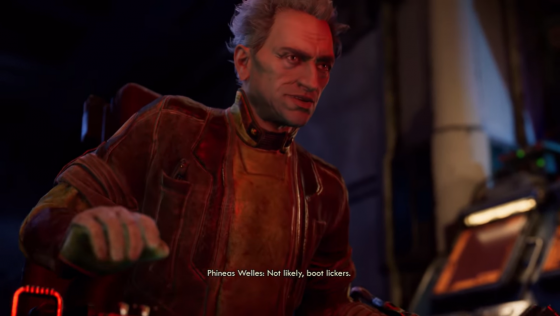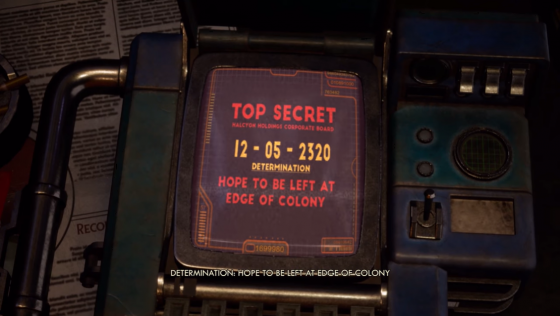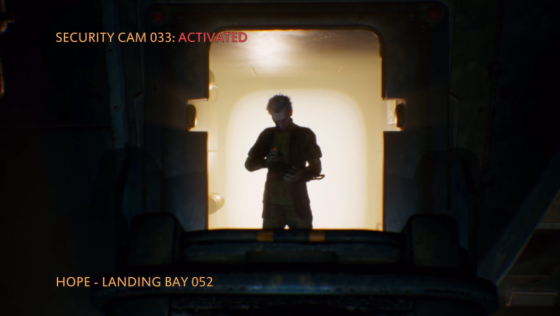Seek out new life and new civilizations, and then steal stuff from them.
The Outer Worlds: To Boldly Go Where Mega-Corps Have Gone Before
I miss the old Sci-Fi Channel. I enjoy how television has caught up to film in terms of quality and the caliber of stories it tries to tell, but I also love that B-grade genre television that found its home on Sci-Fi (now called "Syfy") and other networks. Stargate SG-1, Sliders, Farscape, Eureka, and Warehouse 13 were all fantastic. CW's Legends of Tomorrow is the current standard-bearer of that type of TV; shows that knew they lacked the budget and backing to do something bigger, and had a lot of fun with the resources they had.
The Outer Worlds from Obsidian Entertainment feels like it fits next to those shows. It bursts on the scene as the proper response to Bethesda's handling for the Fallout series, even if lacks the resources to truly compete on equal footing. Instead, this is a smaller, more focused game that knows what it can pull off and aims directly at it. From the opening moments, it feels confident in its characters and presentation, crackling with a verve and life absent in some other RPGs.
The Board Will See You Now
Obsidian's latest places you in the Hibernation Suit of a lone colonist in a galaxy of mega-corporations. Think Disney, AT&T, and Comcast, but with entire planets instead of ISPs and entertainment. It's up to you to fight back against the mysterious Board and other mega-corps that are micromanaging and destroying the lives of everyone that's trying to make a living on the frontier.

The game that ensues is the work of a team led by Tim Cain and Leonard Boyarsky, two gentlemen who were part of the team that created the original Fallout, as well as cult favorites like Vampire: The Masquerade - Bloodlines. The concept The Outer Worlds carries forward from those games is the idea that not every decision is easy-a choice between good and evil, black and white. There's a dark vein of anti-corporate satire running through The Outer Worlds, but your choices are generally about making the best of a bad situation.
As an example, you're sent to find the lifetime research of a scientist for the Auntie Cleo corporation, which is hidden in a "secret lab". (It's not so secret if it has a bright neon sign, you idiots.) The lab itself is mired in a stalemate between corporation guards, outlaw marauders, and wild raptidons?-large lizard-like creatures?-that have been freed from captivity. The guard captain wants you to take out the marauders, who believe they've attacked the lab to free the scientists. Do you help the corporate goon, or the marauder leader who believes they're in the right, but still is a bandit who murdered the lab's workers?
I fought my way to the marauder leader, helped them escape, but sweet-talked my way into getting the research. (Which is for diet toothpaste. Folks died and fought for a diet toothpaste recipe. That doesn't work.) Then I talked down the guard captain and lied to the scientist, telling him that the research was faulty. I'm good at what I do, but what I do isn't always good. That was only one way to deal with that problem. Hell, I could've killed the scientist before he gave me the quest. (I did this to other quest givers accidentally more times that I can count. Thank god for autosave.) When it comes to its quests, The Outer Worlds is pretty flexible in terms of your choices. Shame the quest tracker itself is a bit annoying.
Skillful Survival
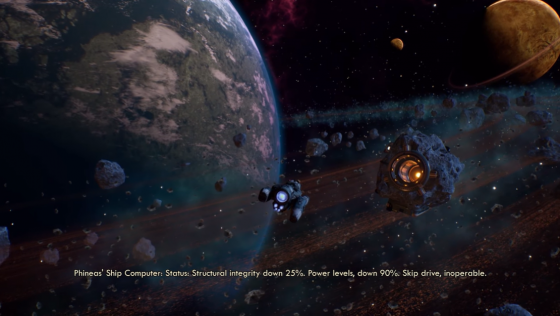
As you lie, cheat, steal, and kill your way through The Outer Worlds, you'll level up. Every level, you get 10 points that you can drop into various categories: Melee, Long Range, Defense, Dialog, Stealth, Tech, and Leadership. Within those categories are other sub-categories, like Persuade, Lie, and Intimidate within Dialog. Skill points spent in category level up all skills within that category, up until a skill level of 50, when you can specialize and start throwing points directly in sub-category.
I was surprised to find key concepts locked behind the skill system. For example, Tactical Time Dilation, The Outer Worlds' version of VATS, is locked down the Melee and Ranged trees. Unless you've dropped a number of points into those trees, TTD just slows time down, which isn't all that useful. Once you've specced into those categories far enough though, you have the ability to aim directly at certain body parts to blind, maim, or cripple enemies.
Combat isn't The Outer Worlds' strong suit, and it actually feels like the game wants you to spend more time talking your way through conflict. The entire game is played in first-person, and the shooting and melee is not much better than the modern Fallout titles. Tactical Time Dilation and its related mechanics are key to making combat a little more meaningful, like shooting a melee-focused enemy in legs to prevent them from reaching you while you companions whittle down their health. Given that I was focusing on leveling up Dialog and Tech, I missed out on those options in combat for many hours. I was a wizard in talking my way through conversations, which is a great way to solve a lot of situations that pop up. But it also meant that when I was forced to fight, I was treated to sort of a slow, boring shooter. (Until I leveled up my Ranged tree.)
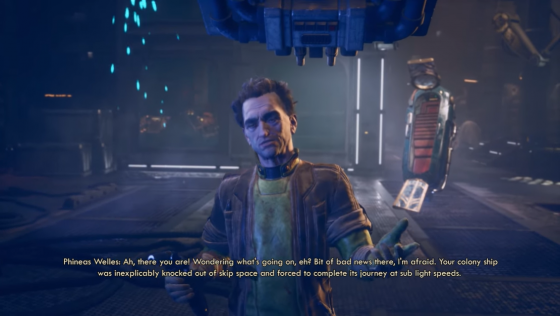
There are also other features locked behind the skill tree, like Perfect Block, which can stagger enemies, or your Companion's special skills, which are under the Leadership tree. I understand why Obsidian did this, but I wish there was a little more highlighting about which key mechanics are under each section of the skill trees. It means you can miss some of the game's nuance if you're not being vigilant.
Strange New Worlds
For the most part, The Outer Worlds' quests are fantastic. But as I mentioned before, there are compromises, most of them on the side of exploration. Visually, The Outer Worlds looks outstanding, with a suite of planets that look pretty different from one another, like the terraformed moon of Scylla and various fungal growths of Monarch. Environmental detail is top-notch, whether it's a dying corporate town, the wilds of Terra-2, or the shining promenade of the Groundbreaker.
That said, this isn't like a modern Fallouts, Skyrim or Assassin's Creed Odyssey, with huge, vast planets to explore. Each planet has one of two regions to wander around in, with a major landmarks in each region. There a few groups of enemies in-between the landmarks, but there's not much in the way of interesting choices or storytelling, just straightforward combat. Sometimes, it can feel like each region is a beautiful movie set surrounding just a few quests. I might not want the incessant hot spots of some bigger RPGs, but I do wish there was a little more to some planets in The Outer Worlds.
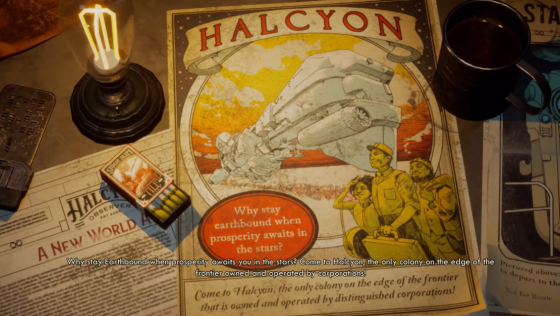
Obsidian does nail the inhabitants of each world though. A cadre of intriguing weirdos inhabits The Outer Worlds' planets, including a rival captain who delivers excuses and "victory sweat," a lab tech who is experimenting on the local fauna to make bootleg Viagra, and a young woman who is buying animal bits to get closer to her stoic beau. Not only is the dialog rather enjoyable, but Obsidian succeeds in an area where larger companies like Bethesda and BioWare have failed: facial animations. Characters don't look entirely perfect, but they're more believable and readable than Fallout 4's dead-eyed NPCs, or Mass Effect Andromeda's broken misfits.
The Outer Worlds cast has that Sci-Fi Channel feeling I've enjoyed in shows like Stargate SG-1 and Firefly. I don't know if they're as entirely memorable as the characters in Mass Effect, but they're fun to be around and get to know. Ellie, a former doctor who prefers more daredevil antics to the medical practice, and SAM, a cleaning robot repurposed as a soldier, are probably the characters that best reflect the tone of the Outer Worlds. They're outlandish, fitting in with satire of most of The Outer Worlds. But even early characters like Parvati or Max Vicar, who seem a bit vanilla, offer a glimmer of more interesting motivations underneath the surface as you progress.
Your companions factor into choices and options over the course of the game. Not only do they chime into conversations (Ellie and Nyoka tend to have a lot of snide remarks, while Parvati feels like her shy nature is pushing you to be nicer), their skills can fill out missing spots in your character build. If you've built a character focused on sneaking and conversational skills, having Parvati or Max Vicar around can beef up your Engineering and Hacking options. It's more important to craft your character than rely on your companions though.

I admit, The Outer Worlds comes just after I've played the more ambitious indie RPG Disco Elysium. That title presented some of its role-playing mechanics in a more interesting fashion than what Obsidian is trying to accomplish here. The Outer Worlds has more polish than Disco, but it's more straightforward. At the same time, it's scope isn't as wide as some of the bigger RPGs available. Instead, The Outer Worlds occupies a solid middle ground.
As someone who's been dissatisfied with the modern Fallout entries, The Outer Worlds is almost a glimpse into another reality. A reality where Bethesda's modern framework was married to the branching quests and nuance of the first Fallout. The combat is fuzzy and the worlds could use a little meat, but The Outer Worlds is a game where I can't help but love talking to its people. To take a peek into their weird, tragic lives.
Like those early Sci-Fi Channel shows, The Outer Worlds knows what it is. This is a team led by vets that knows how to execute with the available resources and a story that doesn't take itself all that seriously. It's a chance to drop into a world and be that scoundrel, that bloodthirsty pirate, that dashing, heroic space captain. And it's an adventure with a bunch of characters that are simply fun to be around. It's a great start to something bigger I hope. So kick back, have a beer or two, and screw around with the crew of the Unreliable.
In an alternate reality where modern Fallout retained the the focus on choice and role-playing, The Outer Worlds would be the result. Obsidian Entertainment delivers this small window into that alternate reality, a game that prizes picking the right skills to tackle weird and wild situations. The Outer Worlds shines in the writing, but the combat doesn't equally rise to the occasion. Likewise, the planets you visit could use a few more quests or interesting spots to explore. The Outer Worlds is still a fun romp though, something that will hopefully build to something bigger in the future.
Other PlayStation 4 Game Reviews By Mike Williams
Scores
Xbox One Version| Overall | 80% |
Scores
PlayStation 4 Version| Overall | 80% |


 22nd October 2019
22nd October 2019

